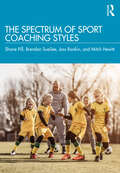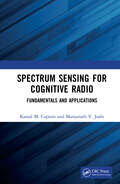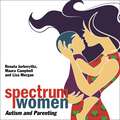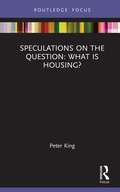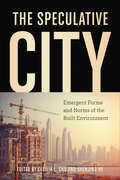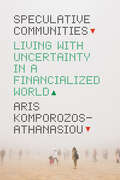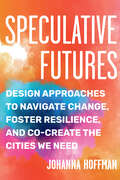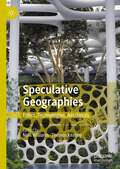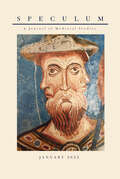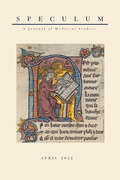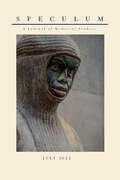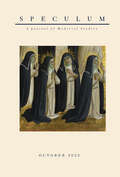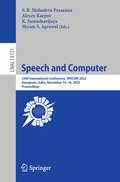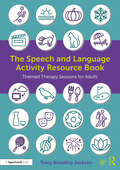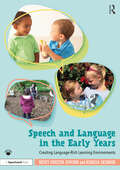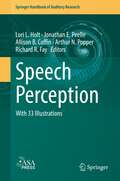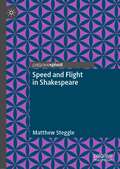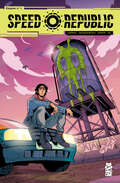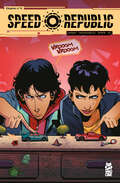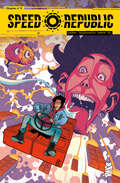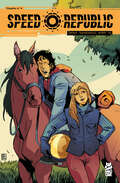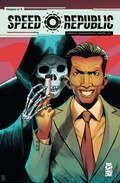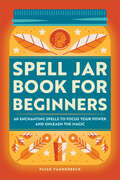- Table View
- List View
The Spectrum of Sport Coaching Styles
by Shane Pill Brendan SueSee Joss Rankin Mitch HewittFor the first time, this book applies The Spectrum to sports coaching to become a Spectrum of Coaching Styles. The non-versus approach to pedagogy taken by The Spectrum places athletes or players at the centre of their learning and clearly defines who (player or coach) is making pedagogical decisions in each style. This clarity allows players and coaches to have their teaching behaviours and decision-making clearly defined, and it provides a common language for players, coaches and practitioners to talk about coaching styles and the expected outcomes. For coaches interested in the holistic development of the player/athlete, The Spectrum provides a detailed framework for achieving multiple learning outcomes through cognitive, social, physical, ethical, emotional and social development.Written by coaches for coaches, this book applies Spectrum theory in a coach-specific/friendly way to the following: Introduction to The Spectrum and the sport coach as educator; Summary and detailed description of the 11 coaching styles and their suitability to particular types of coaching episodes; Outlines of the strengths of each style with application examples; and Explanations of coaching to develop reflective practice, self-analysis and error correction, how to coach players to decide on appropriate practice levels or challenge points, player problem solving and solution generation ability. The Spectrum of Sport Coaching Styles is important reading for coaches, athletes, students and lecturers of sports coaching across any sport.
Spectrum Sensing for Cognitive Radio: Fundamentals and Applications
by Kamal M. Captain Manjunath V. JoshiThis comprehensive reference text discusses concepts of cognitive radio and the advances in the field of spectrum sensing. This text discusses the concept of cognitive radio for next generation wireless communication and a very critical aspect of cognitive radio – that is, spectrum sensing – in detail. It covers important topics including narrowband spectrum sensing, wideband spectrum sensing, cooperative spectrum sensing, system and channel models, detection algorithms, approximation of decision statistics, and theoretical analysis of detection algorithms in detail. Separate chapters are dedicated to discussing the analysis and use of detection algorithms for narrowband spectrum sensing, wideband spectrum sensing, and cooperative wideband spectrum sensing. Aimed at graduate students and academic researchers in the fields of electrical engineering and electronics and communication engineering, this text: Discusses concepts of cognitive radio and research in spectrum sensing. Presents mathematical analysis of algorithms considering practical environment. Explains novel wideband spectrum sensing algorithms with detailed analysis. Provides mathematical derivations to help readers. Discusses basic spectrum sensing algorithms, from narrowband spectrum sensing to the more advanced wideband spectrum sensing.
Spectrum Women—Autism and Parenting
by Renata Jurkevythz Maura Campbell Lisa MorganThis audiobook looks at what it feels like to be an autistic parent, offering valuable insights, knowledge and wisdom on parenting autistic and non-autistic children. Three mothers reflect on their experiences of growing up as undiagnosed autistics, venturing into and embracing motherhood, and connecting with their children in a unique and powerful way.They offer advice on overcoming the challenges of parenting when you are autistic, such as socialising with other parents or sensory issues that come with excessive touch. Reflecting on their own experiences, they also emphasize the positives of being an autistic parent to an autistic child, such as understanding of why their child is struggling or the open-mindedness that can come from not being constrained by societal norms. They also explain how out-of-the-box thinking leads to creative parenting of non-autistic children, forming strong and loving bonds.Full of wit and warm advice, this audiobook empowers autistic parents and reassures them that autism is a strength in raising their children with love, knowledge and experience, while also giving non-autistic parents and professionals a fresh perspective on helping autistic children to thrive.(P) 2022 Jessica Kingsley Publishers
Speculations on the Question: What Is Housing? (Routledge Focus on Housing and Philosophy)
by Peter KingThis book consists of a single essay that speculates on the question what is housing?, and its opposite question, what is not housing? The essay is organised around two distinct discourses around which housing can be framed. The first, which is the dominant discourse, is what I term policy thinking. This is where housing is seen solely in terms of policy formulation and action. The second discourse is private dwelling, which describes housing in terms of a private space used by households. Private dwelling might be seen as a product of policy, but, in actuality, it precedes policy thinking in being the very purpose of policy. Having made this distinction between policy thinking and private dwelling, and so stated in principle what housing is, the subsequent sections of the essay explore the nature of private dwelling in more detail and so substantiate the distinction between the two forms of discourse.
The Speculative City: Emergent Forms and Norms of the Built Environment
by Shenjing He Cecilia L. ChuThe Speculative City explores property speculation as a key aspect of financialization and its role in reshaping the contemporary built environment. The book offers a series of case studies that encompass a range of cities whose urban fabrics have undergone significant transformation in recent years. While the forms of these developments shared many similarities, their trajectories and social outcomes were contingent upon existing planning and policy frameworks and the historical roles assumed by the state and the private sector in housing and welfare provision. By paying close attention to the forces and actors involved in property development, this book underscores that the built environment has played an integral part in the shaping of new values and collective aspirations while facilitating the spread of financial logics in urban governance. It also shows that these dynamics represent a larger shift of politics and culture in the ongoing production of urban space and prompts reflections on future trajectories of finance-led property speculation.
Speculative Communities: Living with Uncertainty in a Financialized World
by Aris Komporozos-AthanasiouSpeculative Communities investigates the financial world’s influence on the social imagination, unraveling its radical effects on our personal and political lives. In Speculative Communities, Aris Komporozos-Athanasiou examines the ways that speculation has moved beyond financial markets to shape fundamental aspects of our social and political lives. As ordinary people make exceptional decisions, such as the American election of a populist demagogue or the British vote to leave the European Union, they are moving from time-honored and -tested practices of governance, toward the speculative promise of a new, more uncertain future. This book shows how even our methods of building community have shifted to the speculative realm as social media platforms enable and amplify our volatile wagers. For Komporozos-Athanasiou, “to speculate” means increasingly “to connect,” to endorse the unknown pre-emptively, and often daringly, as a means of social survival. Grappling with the question of how more uncertainty can lead to its full-throated embrace rather than dissent, Speculative Communities shows how finance has become the model for society writ large. As Komporozos-Athanasiou argues, virtual marketplaces, new social media, and dating apps bring finance’s opaque infrastructures into the most intimate realms of our lives, leading to a new type of speculative imagination across economy, culture, and society.
Speculative Communities: Living with Uncertainty in a Financialized World
by Aris Komporozos-AthanasiouSpeculative Communities investigates the financial world’s influence on the social imagination, unraveling its radical effects on our personal and political lives. In Speculative Communities, Aris Komporozos-Athanasiou examines the ways that speculation has moved beyond financial markets to shape fundamental aspects of our social and political lives. As ordinary people make exceptional decisions, such as the American election of a populist demagogue or the British vote to leave the European Union, they are moving from time-honored and -tested practices of governance, toward the speculative promise of a new, more uncertain future. This book shows how even our methods of building community have shifted to the speculative realm as social media platforms enable and amplify our volatile wagers. For Komporozos-Athanasiou, “to speculate” means increasingly “to connect,” to endorse the unknown pre-emptively, and often daringly, as a means of social survival. Grappling with the question of how more uncertainty can lead to its full-throated embrace rather than dissent, Speculative Communities shows how finance has become the model for society writ large. As Komporozos-Athanasiou argues, virtual marketplaces, new social media, and dating apps bring finance’s opaque infrastructures into the most intimate realms of our lives, leading to a new type of speculative imagination across economy, culture, and society.
Speculative Communities: Living with Uncertainty in a Financialized World
by Aris Komporozos-AthanasiouSpeculative Communities investigates the financial world’s influence on the social imagination, unraveling its radical effects on our personal and political lives. In Speculative Communities, Aris Komporozos-Athanasiou examines the ways that speculation has moved beyond financial markets to shape fundamental aspects of our social and political lives. As ordinary people make exceptional decisions, such as the American election of a populist demagogue or the British vote to leave the European Union, they are moving from time-honored and -tested practices of governance, toward the speculative promise of a new, more uncertain future. This book shows how even our methods of building community have shifted to the speculative realm as social media platforms enable and amplify our volatile wagers. For Komporozos-Athanasiou, “to speculate” means increasingly “to connect,” to endorse the unknown pre-emptively, and often daringly, as a means of social survival. Grappling with the question of how more uncertainty can lead to its full-throated embrace rather than dissent, Speculative Communities shows how finance has become the model for society writ large. As Komporozos-Athanasiou argues, virtual marketplaces, new social media, and dating apps bring finance’s opaque infrastructures into the most intimate realms of our lives, leading to a new type of speculative imagination across economy, culture, and society.
Speculative Futures: Design Approaches to Navigate Change, Foster Resilience, and Co-Create the Citie s We Need
by Johanna HoffmanHow the emerging field of speculative futures can help us dream--and build--better, sustainable, and more equitable cities for everyone.Speculative futures--design approaches that help us visualize new and potential worlds--move us beyond what currently exists into what could one day be. Inspired by art, film, fiction, and industrial design, they use speculation to provoke, imagine, and dream into what lies ahead.Written for futurists, urbanists, and artists looking to enact city-wide transformation--and for readers at the intersection of disruption, design, innovation, and city living--this book offers creative paths toward urban resilience, using design tools that already exist.Artist and urbanist Johanna Hoffman uses an interdisciplinary lens informed by her experience in architecture, art, engineering, and construction to examine how we can reimagine our cities at every level: as individuals, in community, and on a professional scale.Hoffman blends precedent studies, compelling research, and professional memoir, connecting urban development issues with the processes and actions best positioned to create better solutions for our cities. The result is a dynamic field guide that uses speculative futures to imagine, advocate for, and adapt to modern scales, scopes, and speeds of change.While this book is of great utility to professionals in the urban design and planning industries, it&’s also for people who resist received, capitalistic, technocratic ways of thinking--readers who seek new solutions to old problems with anti-colonial, living-systems-oriented lenses.
Speculative Geographies: Ethics, Technologies, Aesthetics
by Nina Williams Thomas KeatingThis book explores how speculative thinking is shaping how we relate to our entangled social, mental, and environmental ecologies. It examines how speculative philosophies and concepts are changing geographical research methods and techniques, whilst also developing how speculative thinking transforms the way human, non-human, and more-than-human things are conceptualised in research practices across the social sciences, arts, and humanities. Offering the first dedicated compendium of geographical engagements with speculation and speculative thinking, the chapters in this edited collection advance debates about how affective, imperceptible, and infra-sensible qualities of environments might be written about through alternative registers and ontologies of experience. Organised around the themes of Ethics, Technologies, and Aesthetics, the book will appeal to those engaging with architecture, Black political theory, fiction, cinema, children’s geographies, biotechnologies, philosophy, rural studies, arts practice, and nuclear waste studies as speculative research practices appropriate for addressing contemporary ecological problems.Chapters 1, 3 and 4 are available open access under a Creative Commons Attribution 4.0 International License via link.springer.com.
Speculum, volume 97 number 1 (January 2022)
by SpeculumThis is volume 97 issue 1 of Speculum. Speculum, an English-language quarterly founded in 1926, was the first journal in North America devoted to the Middle Ages. It is open to contributions in all fields and methodologies studying the Middle Ages, a period that ranges from approximately 500 to 1500. The journal welcomes scholarship that takes a global approach as well as articles that bridge disciplines and appeal to a broad cross section of medievalists. European, Arabic, Byzantine, Hebrew, and Slavic studies are included.
Speculum, volume 97 number 2 (April 2022)
by SpeculumThis is volume 97 issue 2 of Speculum. Speculum, an English-language quarterly founded in 1926, was the first journal in North America devoted to the Middle Ages. It is open to contributions in all fields and methodologies studying the Middle Ages, a period that ranges from approximately 500 to 1500. The journal welcomes scholarship that takes a global approach as well as articles that bridge disciplines and appeal to a broad cross section of medievalists. European, Arabic, Byzantine, Hebrew, and Slavic studies are included.
Speculum, volume 97 number 3 (July 2022)
by SpeculumThis is volume 97 issue 3 of Speculum. Speculum, an English-language quarterly founded in 1926, was the first journal in North America devoted to the Middle Ages. It is open to contributions in all fields and methodologies studying the Middle Ages, a period that ranges from approximately 500 to 1500. The journal welcomes scholarship that takes a global approach as well as articles that bridge disciplines and appeal to a broad cross section of medievalists. European, Arabic, Byzantine, Hebrew, and Slavic studies are included.
Speculum, volume 97 number 4 (October 2022)
by SpeculumThis is volume 97 issue 4 of Speculum. Speculum, an English-language quarterly founded in 1926, was the first journal in North America devoted to the Middle Ages. It is open to contributions in all fields and methodologies studying the Middle Ages, a period that ranges from approximately 500 to 1500. The journal welcomes scholarship that takes a global approach as well as articles that bridge disciplines and appeal to a broad cross section of medievalists. European, Arabic, Byzantine, Hebrew, and Slavic studies are included.
Speech and Computer: 24th International Conference, SPECOM 2022, Gurugram, India, November 14–16, 2022, Proceedings (Lecture Notes in Computer Science #13721)
by S. R. Mahadeva Prasanna Alexey Karpov K. Samudravijaya Shyam S. AgrawalThis book constitutes the proceedings of the 24th International Conference on Speech and Computer, SPECOM 2022, held as a hybrid event in Gurugram, India, in November 2022.The 51 full and 9 short papers presented in this volume were carefully reviewed and selected from 99 submissions. The papers present current research in the area of computer speech processing including audio signal processing, automatic speech recognition, speaker recognition, computational paralinguistics, speech synthesis, sign language and multimodal processing, and speech and language resources.
The Speech and Language Activity Resource Book: Themed Therapy Sessions for Adults
by Tracy Broadley JacksonThe Speech and Language Activity Resource Book offers a flexible and readily available set of activities and worksheets designed to support speech and language therapists as they deliver personalised and engaging therapy sessions. With topics based on seasons, hobbies, sports and celebrations, etc, the worksheets can be selected to suit a client’s interests as well as targeting specific skills and needs. The engaging activities encourage conversation and participation, promoting skill development in a way that is easily translated into everyday communication. Key features of this book include: A range of activities, arranged by level of difficulty, that can be selected based on the client’s individual need A person-centred approach to therapy, enabling the time-poor practitioner the opportunity to personalise their care with ease Photocopiable and downloadable sheets that can be completed during therapy sessions or sent out to the client for home practice, as well as blank worksheets that can be used to create new, appropriate activities Easily adaptable for group sessions, one-on-one therapy sessions and home activities, this is an essential tool for speech and language therapists and occupational therapists, as well as families and other practitioners supporting adults with a range of acquired communication difficulties.
Speech and Language in the Early Years: Creating Language-Rich Learning Environments
by Becky Poulter Jewson Rebecca SkinnerSpeech and Language in the Early Years is an accessible resource, packed full of practical ideas and techniques to support speech and language development in young children. Learning to communicate is a dynamic process. A child needs a reason to communicate, the motivation to communicate, and, significantly, a responsive communication partner. This book will help you to develop language-rich interactions to facilitate language development in your everyday work and will encourage reflective practice in your setting. Key features include: Activities and strategies designed for busy educators to dip in and out of as part of everyday practice, promoting speech and language development as well as supporting those with speech, language, and communication needs Templates and techniques for reflective practice, supporting the creation of language-rich environments and encouraging mindful communication Chapters spanning from birth to the transition to school, each exploring different areas of the learning environment Offering readers the opportunity to extend their skills and confidence in their practice, this book is an essential resource for early years practitioners looking to facilitate quality interactions with the children in their care.
Speech Perception (Springer Handbook of Auditory Research #74)
by Arthur N. Popper Richard R. Fay Allison B. Coffin Lori L. Holt Jonathan E. PeelleThis volume reviews contemporary developments in the auditory cognitive neuroscience of speech perception, including both behavioral and neural contributions. It serves as an important update on the current state of research in speech perception.The Auditory Cognitive Neuroscience of Speech Perception in ContextLori L. Holt, and Jonathan E. PeelleSubcortical Processing of Speech Sounds Bharath Chandrasekaran, Rachel Tessmer, and G. Nike GnanatejaCortical Representation of Speech Sounds: Insights from Intracranial ElectrophysiologyYulia Oganian, Neal P. Fox, and Edward F. ChangA Parsimonious Look at Neural Oscillations in Speech PerceptionSarah Tune, and Jonas ObleserExtracting Language Content From Speech Sounds: The Information Theoretic ApproachLaura Gwilliams, and Matthew H. DavisSpeech Perception under Adverse Listening ConditionsStephen C. Van Hedger, and Ingrid S. JohnsrudeAdaptive Plasticity in Perceiving Speech SoundsShruti Ullas, Milene Bonte, Elia Formisano, and Jean VroomenDevelopment of Speech PerceptionJudit GervainInteractions Between Audition and Cognition in Hearing Loss and AgingChad S. Rogers, and Jonathan E. Peelle Dr. Lori Holt is a Professor of Psychology at Carnegie Mellon University and has affiliations with the Center for the Neural Basis of Cognition and the Center for Neuroscience University of Pittsburgh. Dr. Jonathan E. Peelle is a Professor in the Department of Otolaryngology at the Washington University in St. Louis. Dr. Allison Coffin is an Associate Professor in the Department of Integrative Physiology and Neuroscience at Washington State University Vancouver.Dr. Arthur N. Popper is Professor Emeritus and research professor in the Department of Biology at the University of Maryland, College Park.Dr. Richard R. Fay is Distinguished Research Professor of Psychology at Loyola, Chicago.
Speed and Flight in Shakespeare
by Matthew SteggleShakespeare's plays are fascinated by the problems of speed and flight. They are repeatedly interested in humans, spirits, and objects that move very fast; become airborne; and in some cases even travel into space. In Speed and Flight in Shakespeare, the first study of any kind on the subject, Steggle looks at how Shakespeare’s language explores ideas of speed and flight, and what theatrical resources his plays use to represent these states. Shakespeare has, this book argues, an aesthetic of speed and flight. Featuring chapters on The Comedy of Errors, A Midsummer Night’s Dream, Romeo and Juliet, Henry V, Macbeth and The Tempest, this study opens up a new field around the ‘historical phenomenology’ of early modern speed.
Speed Republic #1 (Speed Republic #1)
by Ryan K. LindseyIn the future, Europe has united under one man, The Autocrat. He rules the apocalyptic landscape from corporate monopolies with a vision of unity that is gospel to some, but hollow to others. To distract the 99% from their poor and empty lives, they are given the opportunity to compete in the Grand Race. A marathon street race through Europe where only one driver can make it to the end and win a life of luxury.Our hero, Sebastian Valencia, enters with the hope that winning this race can make up for his wasted past, but along the way he starts to question what kind of future he is actually buying into. For fans of Cannonball Run and Mad Max.
Speed Republic #2 (Speed Republic #2)
by Ryan K. LindseySeb’s run in with his estranged sister, Shane, was a wake up call that family means nothing in the Grand Race. Now, he must tackle the drag races, booby traps, and sore losers in Zurich to move on to the next city. But when an old friend pops up to give him an opportunity to rebel against the Autocrat, will Seb be able to pull the trigger?
Speed Republic #3 (Speed Republic #3)
by Ryan K. LindseyA strange, psychedelic hitchhiker brings new elements of danger and intrigue to Seb and Shane’s journey as they race to Munich. Meanwhile, with local food supplies being tampered with, the Autocrat’s goons instantly step up to protect his fortune. The Grand Race rolls on!!!
Speed Republic #4 (Speed Republic #4)
by Ryan K. LindseyEvery driver knows about the dangers of the German Gauntlet. Few make it out alive from this playground of the chaotic Dogheads. Seb and Shane must drive carefully as the finish line becomes a reality. Hidden within this treacherous landscape is Project: Theremin, and it’s going to change how the racers view the Autocrat forever!
Speed Republic #5 (Speed Republic #5)
by Ryan K. Lindsey(SERIES FINALE) The Grand Race comes to an end! Who will win? What is their prize? The Autocrat may even get a few surprises of their own in this pulse-pounding epic finale that will leave the fate of Europe forever changed! Artist Emmanuelle Parascandolo and award-winning writer Ryan K Lindsay explore a thrilling story about societal hardship, personal endurance, and how to navigate some of the most dangerous turns in this pulse-pounding classic from Mad Cave Studios!
Spell Jar Book for Beginners: 60 Enchanting Spells to Focus Your Power and Unleash the Magic
by Paige VanderbeckEmbrace the enchanting world of spell jars Spell jars have been used as powerful spiritual tools since the days of ancient Mesopotamia—and now you can learn to harness their power. This beginner's spell book takes you through their history, breaking down the necessary supplies and illuminating how their magic sparks positive change. Gather your materials—Explore different types of vessels, the meaning behind jar shapes and colors, and how to incorporate candles, crystals, and so much more. Prepare for magic—Learn about the importance of cleansing your space, clarifying your intentions, and aligning with astrological events to ensure you're ready for spellcasting. Discover new spells—Find 60 unique and easy-to-follow spells that will help you manifest your dreams, from attracting prosperity to healing a broken heart. Infuse your life with magic and enhance your witchcraft practice with the Spell Jar Book for Beginners.
